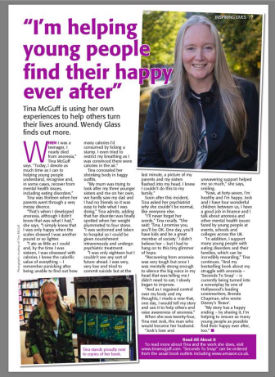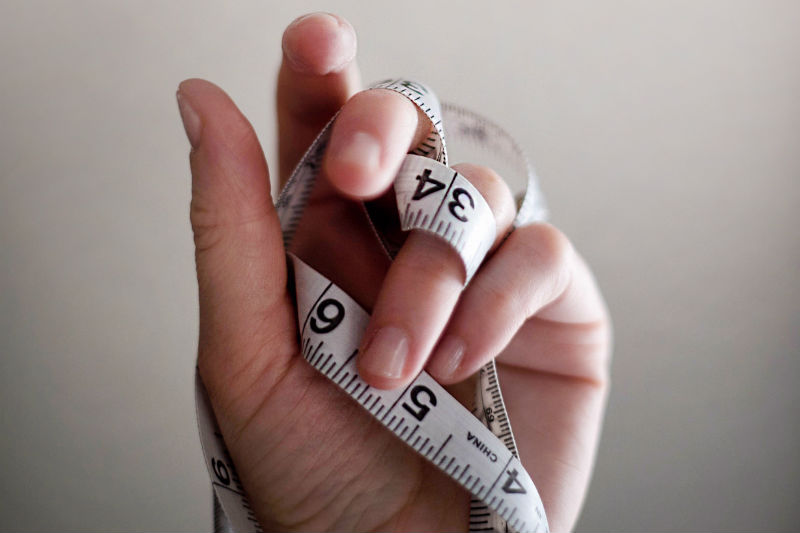I hate the illness anorexia nervosa and what it does to the sufferer, and to their family and friends. So I want to stop it as much as I can, so no one has to go through the hell myself and my family went through.
As a mum of four and now fully recovered I feel it’s my time to tell my story to help as much as I can.
Anorexia nervosa is a serious mental illness that is often stubborn to treat and has one of the highest mortality rates of any psychiatric disorder.
As a teenager, my family fell apart after a very bitter and nasty divorce.
My sisters, mum and I became homeless and at times had to raid bins for glass bottles in exchange for food.
My young brain was ill-equipped to deal with the situation and created the monster of anorexia as a way of controlling something in my life.
It became my best friend in a black hole of severe OCD, depression, high levels of anxiety, panic attacks, suicidal tendencies, intrusive thoughts, self-loathing, social isolation, insomnia, self-harming, lack of confidence, distrust as well as a huge and terrifying episode of psychosis.
Back then, there was not a moment when I expected to live to old age, let alone have a great and worthy life one day.
However, an incredible doctor gave me a tiny glimmer of hope, which I clung onto during my recovery.
Through huge amounts of intense inpatient treatment, medication and self-discovery I turned my whole life around to become a wife, mother and friend. I love my life and I am truly grateful each day – and thankful to all the people who saved it.
I vowed if I ever made it through I would write about it to help others.
Everyone needs hope, love, stability and to know that if they get sick there will be effective local help available, and provided with the same urgency as any other emergency.
There is nothing more terrifying than a severe episode of mental illness – it must be a million times worse for child who can’t understand what’s going on. They need to be close to family each day for extra emotional support. It’s also very traumatic for the family when the person they love can’t access treatment or get a bed.
You can die. Anorexia has the highest mortality rate of all mental illness due to the medical fragility of the body or suicide.
The brain is an organ, a particularly special one. Scientists are working hard to bring us more knowledge and insight into this incredible part of our body which contains so many complexities.
Last year I did a review for Psychologies magazine of a Radio 4 programme by Dr Sally Marlow called ‘Rethinking Anorexia Nervosa’
It was fascinating as it covered so much new research from across the globe of the treatment of the illness.
It included results around a treatment called deep brain stimulation (DBS), a method currently used to treat Parkinson’s. It involves implanting very fine wires into the brain with electrodes and stimulating areas that control dysfunctional behaviors.
All of this is music to my heart, as I fully understand the condition’s complexities and its potential threat to life. Any new way to help treat this awful condition is incredibly hopeful, and will fill families lives with hope too.
Let’s get talks about mental health into schools, workplaces, hospitals, universities across the globe. Early intervention is key to recovery for most illnesses, so all awareness is great awareness.
If there is early intervention and insight into mental health, we can help stop the problems appearing in the first place, lessening the strain on doctors, nurses, the NHS and crucially, the people affected by these debilitating conditions.
But from one parent to many others I would like to say – if you feel your child is struggling in anyway please act upon your instincts as they are usually right and could potentially be lifesaving.
The warning signs of an eating disorder can be very subtle, but also glaringly obvious. Your child may become withdrawn, depressed, obsessive over exercise and food, they might not be sleeping well, have anxiety, terrible self-esteem issues, lack of confidence and be angry. These are just some of many signs there is something going on.
From all my experiences working with families and sufferers I know the heavy-handed approach is not always the right way to tackle the subject as trust is key. It’s all about gaining trust and allowing your child to know you are there no matter what but they need help and you can help them access that.
It’s also important to know the process can be long and difficult. It’s not going to be easy by any stretch of the imagination. Baby steps all the way and huge tenacity, patience, truth and trust.
But also know there is hope of recovery – never give up fighting this illness to reclaim your life.
If you, or someone you love is affected by anorexia, you can find support in the UK from Anorexia and Bulimia Care
Like this? Share it! For the latest from The Motherload®, head to our homepage.
About Tina
I’ve written about my journey in my book Seconds To Snap which has allowed me to have an amazing review by the Lancet as well as many TV appearances. It’s an amazing platform to raise awareness and help end the stigma after years of living in its shadow. You can find more on my website.



No comments yet. Be the first one to leave a thought.